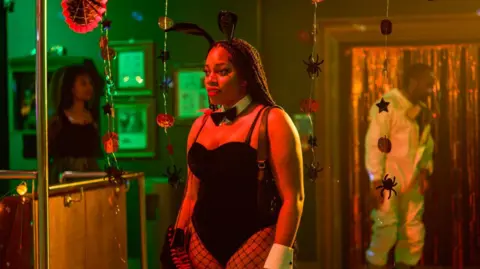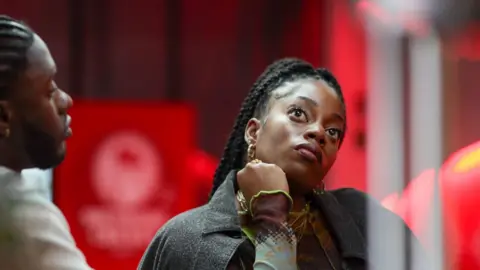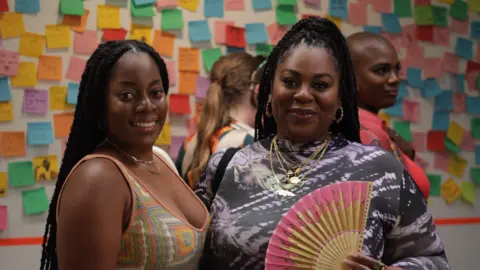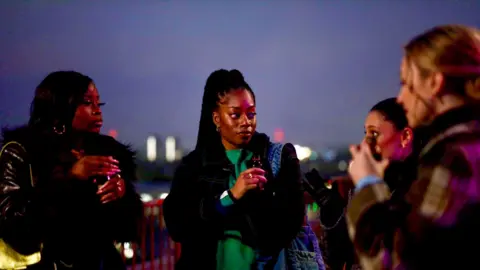[ad_1]
Yasmin Rufo,BBC News , @YasminRufo
 Channel 4
Channel 4Creating a Bridget Jones-esque character is nothing new.
In hundreds of books, films and TV series you will find chaotic, boy-obsessed millennial women all in pursuit of the same goal: finding their one true love.
But one of those characters that has managed to cut through is Queenie.
Dubbed as “the black Bridget Jones” by the book’s author Candice Carty-Williams, Queenie is a 25-year-old British-Jamaican woman from Brixton, south London.
As well as navigating the usual trials and tribulations of a single woman in her 20s – think dating horror stories and daily identity crises – she is also battling a system that seems to be against her.
“That is what makes her a thousand times more political than Bridget Jones,” explains 34-year-old Carty-Williams.
The 2019 best selling book has now been adapted into an eight part Channel 4 drama.
“It was a huge challenge having to cut down 100,000 words into eight lots of 25 minute episodes,” Carty-Williams says. “You feel protective over the storylines and you want to make sure you stay true to the characters and events.”
 Channel 4
Channel 4 Described by The Guardian as an “important political tome of black womanhood and black British life”, Queenie doesn’t shy away from addressing issues such as everyday racism, feeling out of place and mental health.
In the first episode alone, Queenie deals with a gynaecology appointment that doesn’t quite go to plan, her boyfriend’s elderly relatives commenting on the skin colour of her future children, and a tragic break-up.
She also grapples with men who only want to sleep with her because she’s black, and accusations from her Jamaican grandmother that she is bringing shame on the family for going to therapy.
“I was desperate for a black woman that wasn’t the sassy sidekick or angry girlfriend but was just real and honest,” Carty-Williams tells the BBC.
“That’s why you do have this messy girl Queenie who is trying to figure out who she is, away from all the stereotypes.”
But there is also a universality to the character.
“Everyone experiences heartbreak, loss and anguish so this story isn’t just for black women, it’s for every woman out there and I often meet women of all ethnicities and backgrounds who tell me about the impact Queenie has had on them,” Carty-Williams says.
 Channel 4
Channel 4 Doing justice to such a powerful character was at the forefront of actress Dionne Brown’s mind, particularly as it was her first major acting role since drama school.
“When I read the book it felt like a weight off my chest, I had no idea that other people also felt like this,” explains the 28-year-old actress.
“So there was a pressure straight away, knowing that this character has done so much for so many people and you don’t want to let anyone down.
“But eventually you just have to let go of that and focus on doing the best you can.”
In 2020, Queenie won Book of the Year at the British Book Awards, and was runner-up for the Costa First Novel Award.
The novel reached number two on the Sunday Times bestseller list and was also shortlisted for book of the year prizes by Waterstones, Foyles and Goodreads.
‘Nerve-wracking sex scenes’
Another new challenge for Brown while shooting the TV adaptation was filming sex scenes.
Throughout the show, Queenie has a number of sexual encounters and some of them are particularly traumatic.
“I never did any romantic scenes at drama school so filming these were definitely nerve-wracking, especially the harrowing ones,” Brown says.
She credits the intimacy coordinator on set for being “so helpful in informing me about my rights and dispelling myths”.
“There were loads of things I just assumed were normal, but when I told the intimacy coordinator she said that wasn’t the case.
“If you’re not comfortable with being touched in certain places or have someone else’s tongue in your mouth then you absolutely do not have to do it,” she says.
 Channel 4
Channel 4 Striking the balance between addressing such sensitive topics as well as making people laugh takes a special kind of talent.
“I was raised believing that if you don’t laugh then you’ll cry so actually laughing things away has always been a coping mechanism for me,” says Carty-Williams.
“Given that we are touching on such dark themes like miscarriage and trauma I knew we just had to have that humour in there as well.”
And the series is not short of funny moments – there’s a bolshie Pakistani BMW driver who is convinced that Queenie is in love with him, a grandma who warns Queenie about Gemini men and a best friend, Kyazike, who refers to Queenie’s boyfriend as “the ivory king” and “parchment paper papi”.
There are also some rather poignant moments, notably how her WhatsApp group of friends, nicknamed The Corgis, support her through her breakup and how her relationship with her family develops and improves.
Across the eight episodes, Queenie begins to learn that romantic love isn’t the only, and definitely not the most important, love that exists.
It is the love provided to her by friends and family that is far more powerful.
Queenie begins on Channel 4 at 22:00 BST on Tuesday 4 June, with episodes also available on the network’s streaming service.
[ad_2]
Source link




